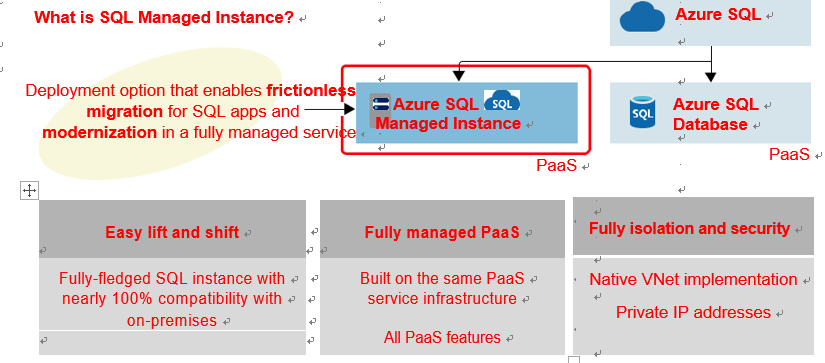Azure SQL Database
Azure SQL Database is a fully managed relational database service provided by Microsoft Azure. It offers the broadest SQL Server engine compatibility and powers your cloud applica-tions with a variety of built-in features such as intelligent performance tuning, scalability, high availability, and advanced security capabilities.
Azure SQL Database operates as a database as a service (DBaaS), meaning you don’t have to worry about managing the underlying infrastructure. Instead, you can focus on optimizing your data and developing robust, data-driven applications.
USE CASES
Azure SQL Database, with its fully managed, scalable capabilities, is an exemplary choice for a range of contemporary application architectures. This managed database service is fine-tuned for the cloud environment, making it particularly well-suited for the following scenarios:
■■ Modern cloud applications: Azure SQL Database is an excellent choice for modern cloud applications because of its built-in intelligence and scalability features.
Skill 2.2: Describe relational Azure data services CHAPTER 2 47
- Microservices architectures: Its ability to independently scale out database makes it suitable for microservices architecture where each microservice can have its dedicated database.
- Multitenant applications: If you’re developing a SaaS application that needs to pro-vide a separate, isolated database for each customer (multitenancy), Azure SQL Data-base is a great choice because of its isolated database capabilities.
BUSINESS BENEFITS
Azure SQL Database stands out in the realm of cloud services, offering a suite of benefits that underscore its value proposition for businesses seeking efficient, scalable, and secure database solutions. Embracing Azure SQL Database can lead to a more streamlined operational model with a focus on innovation and growth:
- Lower total cost of ownership (TCO): With Azure SQL Database, you don’t need to purchase, set up, or manage any physical hardware, reducing your overall expenses. It also provides predictable billing and cost-efficiency with a pay-as-you-go model.
- Scalability: Azure SQL Database offers the ability to quickly scale resources up or down based on your needs. You can adjust compute and storage resources independently
in seconds, ensuring you always have the resources you need without overpaying for excess capacity.
- High availability and disaster recovery: Azure SQL Database comes with built-in high availability, automated backups, and geo-replication capabilities. It ensures that your data is available and protected at all times, reducing the risk of data loss.
- Advanced security: Azure SQL Database provides a high level of security with features such as automated updates, threat detection, data encryption, and compliance with various international and industry-specific compliance standards.
- Time savings: Because Azure SQL Database is a fully managed service, you don’t need to spend time on database administration tasks. Instead, you can focus on what truly matters: developing and optimizing your applications.







